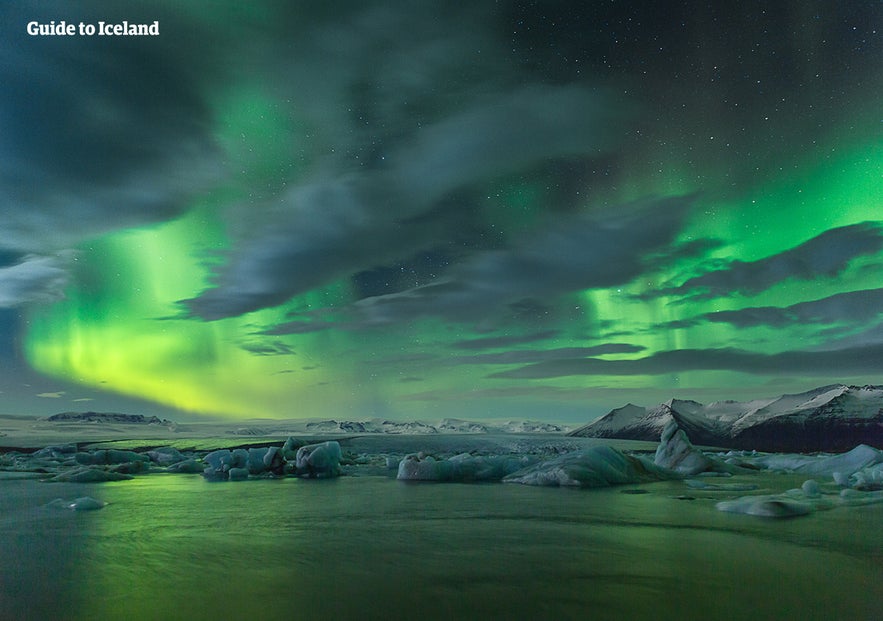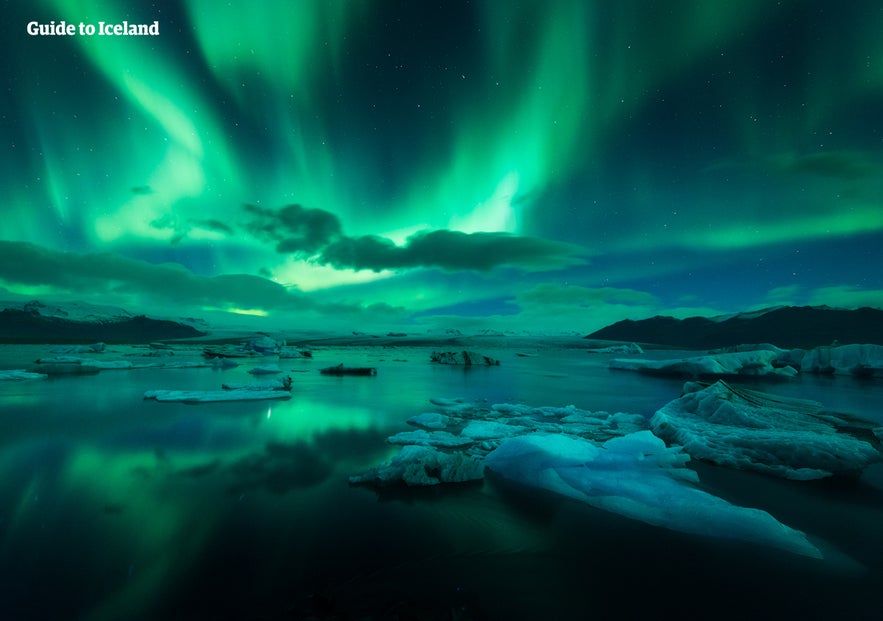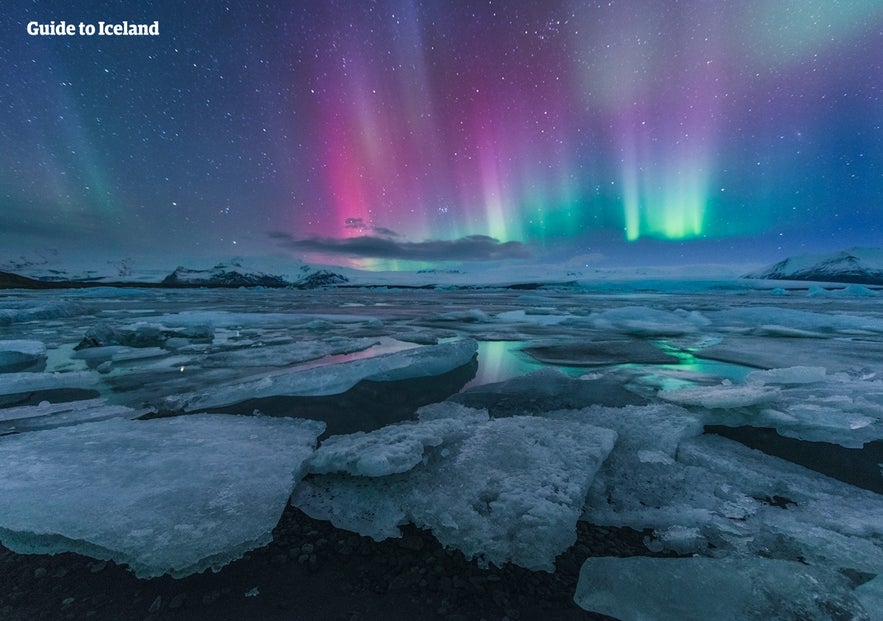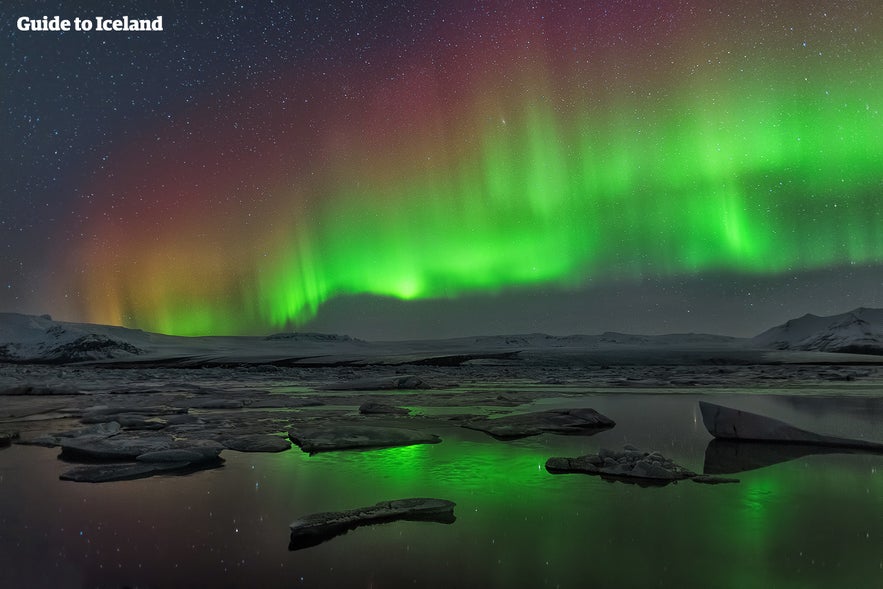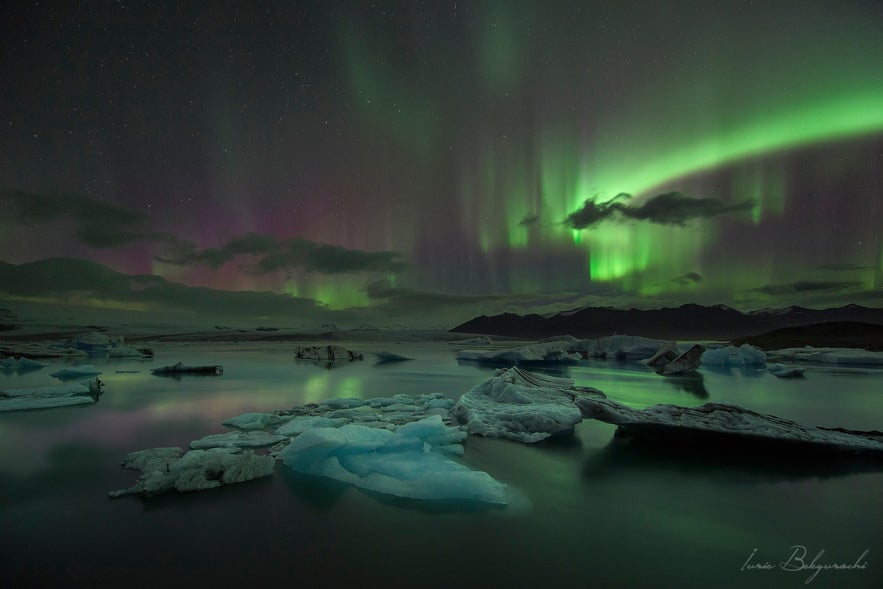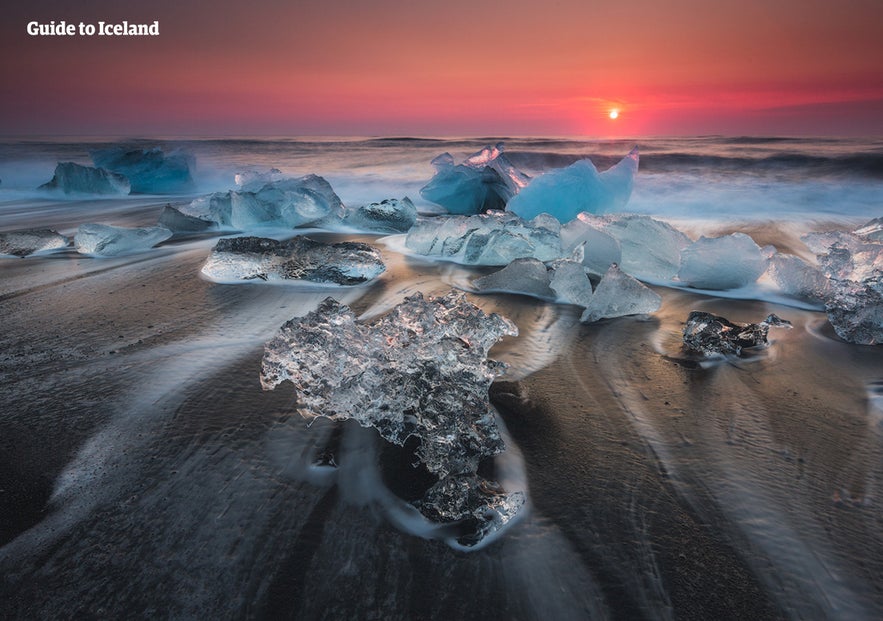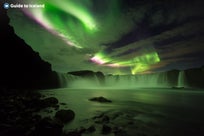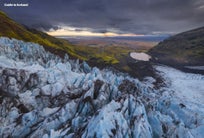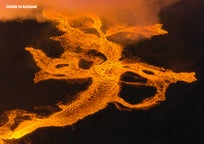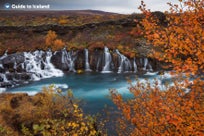
Northern Lights at Jokulsarlon Glacier Lagoon

- Why Choose to Watch the Northern Lights at the Jokulsarlon Glacier Lagoon?
- How to Watch the Northern Lights at the Jokulsarlon Glacier Lagoon
- FAQ's About the Northern Lights in Jokulsarlon Glacier Lagoon
- What clothing should I wear for a night at the Jokulsarlon glacier lagoon?
- How can I see the aurora forecast for Jokulsarlon glacier lagoon?
- Are there any facilities by Jokulsarlon glacier lagoon for visitors at night?
- What precautions should I take while visiting the Jokulsarlon glacier lagoon at night?
How can you experience the Northern Lights over “The Crown Jewel of Iceland,” Jokulsarlon glacier lagoon? What does it look like when these two beautiful, yet separate natural phenomena come together? What is the best time of year to make this dream a reality? Read on to find out more about the Northern Lights at Jokulsarlon glacier lagoon.
People travel to Iceland for many reasons, though the vast majority will readily admit that it is the country’s natural beauty that first attracted them to come here. Be it the gnarled mountain ranges, the billowing geothermal vents, or the tumbling waterfalls, it is Iceland’s untouched and undeveloped wild side that has helped reach out to the hearts and minds of millions of travelers worldwide.
If you're looking to stay near this amazing location, check out the many hotels and accommodations at the Jokulsarlon glacier lagoon. There are also many fantastic northern lights hotels around Iceland that offer great locations for aurora spotting.
- Get to know more: FAQ About the Northern Lights in Iceland | Science & Mythology
One particular draw is the possibility—and it’s only ever a possibility—of seeing the Aurora Borealis, otherwise known as the Northern Lights. The Northern Lights are a natural light display, a phenomenon that occurs when the magnetosphere is disrupted by solar winds, causing light particles to ionize and thus emit energy of varying color patterns as they move into the upper atmosphere of the Earth’s magnetic field.
- See also: Northern Lights in Iceland
But don't worry if that sounds too complicated... not many people are dwelling on the science behind the aurora as they're looking up upon those dancing, dazzling waves of green, purple, and pink.
Why Choose to Watch the Northern Lights at the Jokulsarlon Glacier Lagoon?
Experienced northern lights hunters will quickly tell you that the best chance of seeing this dazzling solar light show is away from the light pollution of urban centers.
Thankfully, Iceland has dark open spaces in abundance, but to truly make the most out of this bucket-list experience, committed travelers want to ensure their environment matches the aesthetic beauty above. For that, there is only one place, Jokulsarlon glacial lagoon.
- See also: Glacier Lagoons in Iceland
Jokulsarlon is colloquially referred to as “The Crown Jewel of Iceland” because of its staggering, visceral appeal and unofficial title as the South Coast’s final sightseeing attraction.
Enormous icebergs break away from the glacier tongue, Breiðamerkurjökull (originating from the far larger icecap, Vatnajökull), falling into the lagoon where they float idly, crunching into one another as seals and seabirds fill the scene with life.
Jokulsarlon is Iceland's deepest lake, measuring 248 meters in depth, and has been growing larger every year as the effects of climate change continue to decay the country's fragile glaciers. It is thought that in a century's time, the location of Jokulsarlon will instead be a newly formed fjord.
Whilst some visitors choose to partake in an exciting Zodiac boat tour, an experience that allows them to get within touching distance of the icebergs, others choose merely to sit on the banks of the lagoon and allow this surreal, frozen scene to play out quietly in front of them. In this sense, Jokulsarlon glacial lagoon is one of the optimum locations in the country for those travelers seeking solitude, tranquillity, and untouched nature.
Given that Jokulsarlon lagoon is found in Vatnajökull National Park, the second largest nature reserve in Europe, the entire surrounding landscape is superb, a collage of steep mountain slopes, freezing crevasses, and lush vegetation, only adding to the location’s appeal.
And without any urban development in the immediate area, Jokulsarlon has become one of those destinations that Northern Lights hunters dream about, a spot of suitable darkness where it is impossible to tell whether the sky or the earth is the more dazzling scene. For that reason alone, Jokulsarlon is considered unsurpassable when it comes to looking out for the aurora.
How to Watch the Northern Lights at the Jokulsarlon Glacier Lagoon
As with almost all natural phenomena, there is no exact telling as to when the Northern Lights will appear; they are, after all, notoriously elusive and unpredictable, sometimes lasting hours, sometimes little more than two minutes. To catch them hovering above you is a blessing, but there are ways to help manifest such an experience into reality.
- See also: How to Photograph the Northern Lights
One of the best ways to ensure that you see the Northern Lights is to take the responsibility out of your own hands somewhat and, instead, opt for a guided tour or package with a certified Northern Lights operator.
Not only are such tour providers vastly experienced and knowledgeable when it comes to knowing the best spots and times to see the Aurora, but they will also provide a wealth of information and bonus activities otherwise unavailable to the autonomous traveler.
For example, this 2-day South Coast tour to Jokulsarlon glacier lagoon also includes a spot of ice caving, one of the most thrilling and authentically Icelandic experiences available—and who knows, perhaps you'll even see the Aurora appear as you descend from your position on the ice cap?
For those who would like to spend longer in the area, a 3-day tour to Jokulsarlon with ice caving is also available, offering something a little different than mere sightseeing.
The ice caves are generally only accessible on guided tours between either mid-October or November and March each year when the weather is suitably cold enough for the caves to maintain their structure. However, you can see the aurora between September and April, leaving plenty of opportunity for those looking to tick the Northern Lights from their bucket list.
And quite frankly... that should be everybody.
For the very best winter activity in Iceland, check out the following 5-day winter package. On this multi-day experience, you will have the opportunity to tour the glacier lagoon, Jokulsarlon, explore some of the country's dazzling blue ice caves, experience the famed sightseeing route, the Golden Circle, and even pay a visit to the warm and soothing waters of the Blue Lagoon, the perfect way to cozy up after a week of frozen adventures.
Naturally, if you're lucky enough to catch the Northern Lights at Jokulsarlon, you will, by default, also be seeing them from the nearby Diamond Beach, only a five-minute walk away from the lagoon.
This strip of coastline is named after the hundreds upon hundreds of glittering icebergs that wash up against the beach's black sand, thus decorating the area like an all-natural tiara.
The Diamond Beach is the final exit point for icebergs in the lagoon until they drift off into the Atlantic Ocean. Visitors here can actually follow this all-natural process, providing a fantastic insight into the water cycle that has so come to define this country.
So, if you're looking to visit Iceland during the dark, cold, yet sublimely beautiful winter months, make sure to focus your attention on catching the Northern Lights at Jokulsarlon glacial lagoon, the ultimate vantage point for looking deep into that mystic and mysterious cosmos.
The experience is sure not to disappoint.
FAQ's About the Northern Lights in Jokulsarlon Glacier Lagoon
What clothing should I wear for a night at the Jokulsarlon glacier lagoon?
When visiting the Jokulsarlon glacier lagoon at night, wear layered, insulated, and waterproof clothing and sturdy waterproof boots to stay warm and dry in a cold, damp environment. Gloves, a hat, and a scarf are also necessary to ensure your hands, head, and neck are well-protected. Bringing extra layers is always a good idea in case the temperature drops further during the night.
How can I see the aurora forecast for Jokulsarlon glacier lagoon?
The Icelandic Meteorological Office provides an aurora forecast that shows cloud cover and activity levels for all of Iceland. You can easily see how the conditions are at the Jokulsarlon glacier lagoon. Always remember to check the weather conditions, as clear skies are crucial for optimal aurora viewing experiences.
Are there any facilities by Jokulsarlon glacier lagoon for visitors at night?
The Jokulsarlon glacial lagoon is quite remote, and facilities are limited at night. You should plan ahead, bringing essentials like food, water, and extra clothing. For convenience, choose accommodation close to the Jokulsarlon lagoon.
What precautions should I take while visiting the Jokulsarlon glacier lagoon at night?
When visiting the Jökulsárlón glacier lagoon at night, use a flashlight or headlamp for visibility. Wear non-slip footwear for safety on icy or uneven terrains and stay on designated paths. Avoid the water’s edge, especially in icy conditions, and never try to go on the icebergs.
Did you enjoy our article about the Northern Lights at Jokulsarlon Glacier Lagoon? Did you have the chance to experience either during your stay in Iceland? How was your Northern Lights experience this winter? Please, feel free to leave your thoughts and queries in the comment below.
Andre interessante artikler
Den beste tiden å se nordlyset på Island
Finn den beste tiden på året for å se nordlyset på Island. Få mer informasjon om beste sesong og måned for å oppleve nordlyset på Island. Nordlyset er et av naturens mest magiske severdigheter, men...Les mer
Nordlyset på Island – Når og hvor kan jeg se nordlyset
Lær alt du trenger å vite om hvordan du kan se nordlyset på Island i denne omfattende guiden. Oppdag de beste stedene å se nordlys og lær om når du kan se det i løpet av året. Nordlyset er på drømme...Les mer

Last ned Islands største reisemarkedsplass på telefonen din for å administrere hele reisen på ett sted
Skann denne QR-koden med telefonen din og trykk på lenken som vises, for å legge til Islands største reisemarkedsplass. Legg til telefonnummeret ditt eller e-postadressen din for å motta SMS eller e-post med nedlastingslenken.
